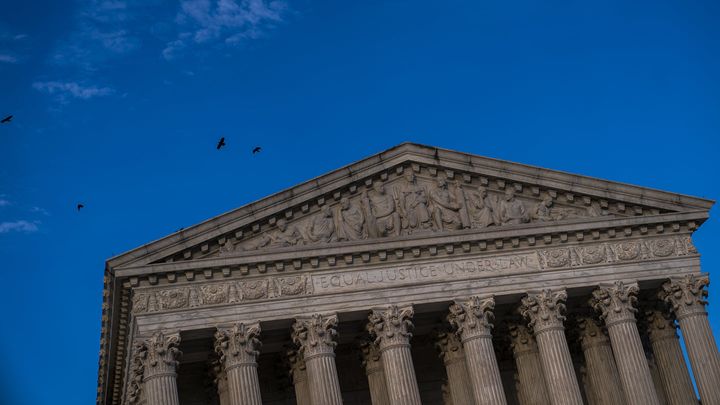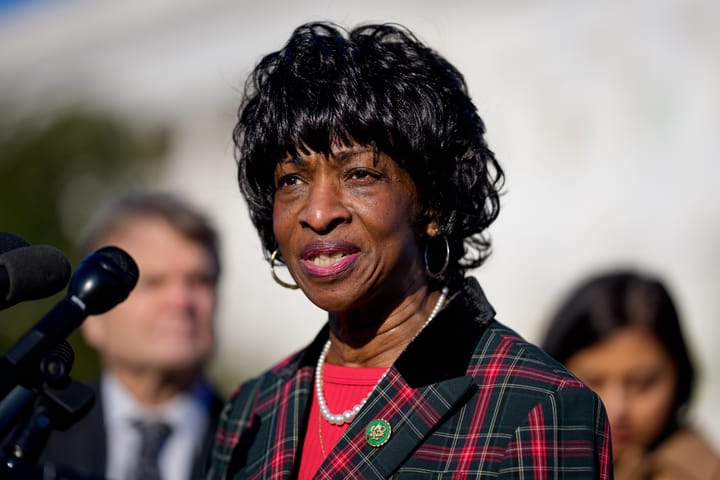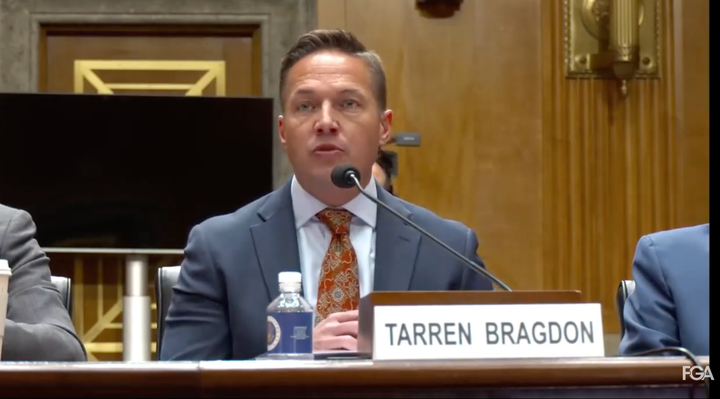The Supreme Court agreed to hear a case next term that could give state legislators vast new powers over congressional and presidential elections, potentially allowing them to directly appoint Electoral College electors.
The case, Moore v. Harper, has been brought by Republicans in the North Carolina legislature, who are appealing a congressional district map for the state that was drawn earlier this year by the North Carolina Supreme Court after it determined the map drawn by the legislature unfairly benefited Republicans. The North Carolina Republicans, led by House Speaker Tim Moore, argue that the U.S. Constitution gives state legislatures the sole authority to set the “Times, Places, and Manner” of holding elections for the U.S. Senate and House of Representatives. The case parallels one brought to the Supreme Court in late February by Pennsylvania Republicans arguing against Democratic Gov. Tom Wolf’s veto of district maps that came out of the Republican-controlled state legislature. On March 7, the Supreme Court declined to hear the Pennsylvania case, Toth v. Chapman, referring it to a district court, but left open the possibility that they could pick up the case on appeal.
The Moore v. Harper case rests on what’s called the independent state legislature theory (ISLT), described by the nonpartisan Brennan Center for Justice as a “radical and unprecedented approach to the U.S. Constitution’s Elections and Electors Clauses that would give state legislatures wide authority to gerrymander electoral maps, pass voter suppression laws, and, at the most extreme, overturn elections.” The conservative majority on the Supreme Court could hand to state legislatures total control over which Electoral College electors it approves, with no checks from the state executive or judicial branches. It could also protect their laws related to things like voter registration and identification from judicial review.
In an alarmed response to the Supreme Court’s announcement that it would hear the case, Michael Li, the Brennan Center’s senior counsel in the Democracy Program, wrote on Twitter that state courts have recently served as a bulwark against partisan gerrymandering in states where both Democrats and Republicans control the legislatures.
This year, courts in Maryland and New York threw out district maps drawn by Democrats as gerrymandered. In January, courts in Alabama and Ohio struck down maps that unfairly benefited Republican politicians, in addition to the cases in Pennsylvania and North Carolina.
In 2018, Li told Sludge, “It’s important to have a check and balance in the process because state legislatures often are prone to be captured by special interests, especially when it comes to something like redistricting that your average member doesn’t understand and maybe never has done before—since it takes place only once every 10 years.”
The claim of ISLT that only state legislatures can determine federal election processes would break Supreme Court precedent, where the term “legislature” has been determined to refer more broadly to individuals or bodies in state government that have some part of lawmaking power. A forthcoming academic paper from law professors Leah Litman and Kate Shaw details how ISLT, in its strict elevation of state legislatures over other branches of state government, “is fatally inconsistent with basic precepts of both federalism and the separation of powers.”
In a statement, Bob Phillips, executive director of good government group Common Cause North Carolina, said, “In a radical power grab, self-serving politicians want to defy our state’s highest court and impose illegal voting districts upon the people of North Carolina.” In February, the North Carolina Supreme Court rejected the Republican-drawn legislature’s district maps by a vote of 4-3 of its Democratic majority, saying the maps were “beyond a reasonable doubt” in violating rights of free elections and free speech.
Allison Riggs, chief counsel for voting rights at the Southern Coalition for Social Justice, which is representing Common Cause in the case, said in a statement, “Today’s news from the U.S. Supreme Court makes one thing clear: this fall, the future of multiracial democracy is at stake. In Moore, North Carolina lawmakers argue they essentially get a ‘free pass’ to violate state constitutional protections against partisan gerrymandering when drawing districts which undeniably hurt voters.”
Mark Gaber, senior director of redistricting at the nonprofit Campaign Legal Center, said in a statement, “This could pave the way for bad faith politicians to manipulate election maps and laws to suit their political interests instead of the interests of voters.”
The bloc of four conservative justices—Clarence Thomas, Samuel Alito, Neil Gorsuch and Brett Kavanaugh—have indicated their openness to ISLT. In October 2020, the four justices sided with Pennsylvania Republicans in a decision that would have required the state to stop accepting absentee ballots on Nov. 3 when polls close—which law professor Rick Hasen wrote was an endorsement of ISLT, in deferring to the legislature’s whims.
The über-conservative former Judge J. Michael Luttig, appointed by President George H. W. Bush, discounted the ISLT in an April op-ed, warning it could be used to promote false election claims as attempted after the 2020 presidential election by pro-Trump Republican figures. Legal expert Hasen anticipated last year that five or six justices could endorse ISLT.
Ties to the Right-Wing Judicial Network
One influential conservative group promoting ISLT has been the Honest Elections Project, which The Guardian and OpenSecrets reported is a rebrand of the shadowy Judicial Education Project. The Honest Elections Project is an alias of the 501(c)(3) nonprofit 85 Fund, which was founded by powerful Federalist Society board co-chair Leonard Leo in early 2020 to fund efforts promoting conservative judges supported by Republicans. The 85 Fund received some $20 million in 2020 from Donors Trust, CNBC reported, a nonprofit that does not disclose its wealthy donors. Other tax records show that Donors Trust and its supporting organization the Donors Capital Fund have been used to fund an array of right-leaning causes by megadonors including the Koch, DeVos, Bradley, and Mercer families. Last year, video obtained by the nonprofit watchdog Center for Media and Democracy showed that the Honest Elections Project hosted a voter suppression academy at a meeting of the American Legislative Exchange Council (ALEC), a right-wing nonprofit that helps state legislators collaborate with corporate lobbyists to create policy proposals.
Leo, from his perch at the Federalist Society, has operated as a top Republican “judge whisperer,” reportedly personally curating a list of Supreme Court candidates for President Donald Trump that included three of the justices who now form a conservative supermajority.
In October 2020, the Honest Elections Project filed an amicus brief with the Supreme Court in the case brought by Pennsylvania Republicans, which Salon reported was prepared with assistance of counsel BakerHostetler, a prestigious law and lobbying firm. In the brief, it laid out the ISLT argument and said that “only the Pennsylvania General Assembly, not the Pennsylvania Supreme Court, may establish regulations governing the upcoming presidential elections.”
Another amicus brief in Moore v. Harper was filed in March 2022 by the National Republican Redistricting Trust, an organization founded in 2018 to defend Republican legal efforts around the decennial redistricting processes. The legal trust’s executive director is Republican operative Adam Kincaid, who also serves in that role for the 501(c)(4) nonprofit Fair Lines America. The brief similarly argues that the Elections Clause grants the regulation of federal elections solely to the legislature.
In North Carolina, Speaker of the House Tim Moore’s top campaign contributors over his career have included North Carolina Association of Realtors, power and natural gas company Duke Energy, and AT&T, according to data compiled by the nonprofit National Institute on Money in Politics. The PACs of those three donors have contributed nearly $168,000 to Moore’s campaigns and over $200,000 more to the North Carolina Republican Party. Moore was elected to the state House in 2002 and elected speaker in 2015.
The case will be heard during the Supreme Court’s Fall 2022 term and a decision is expected early next year.



